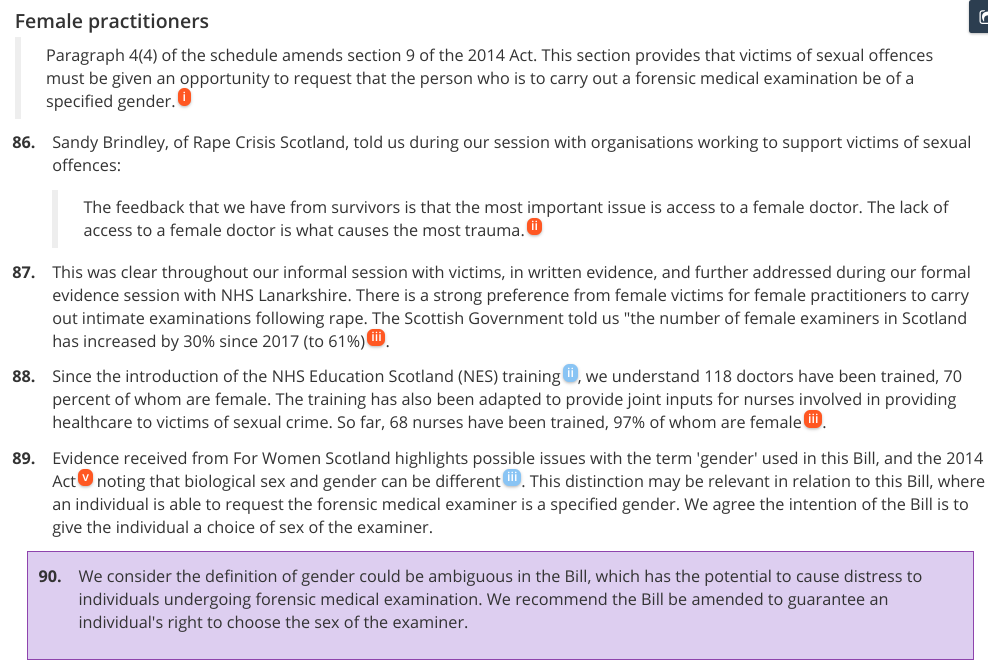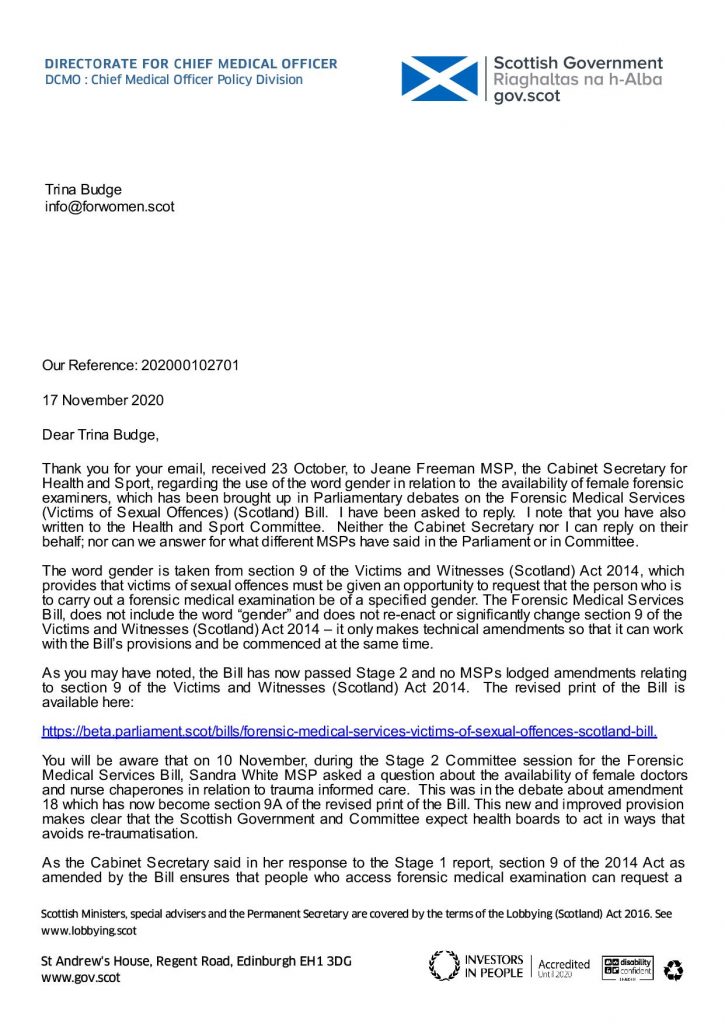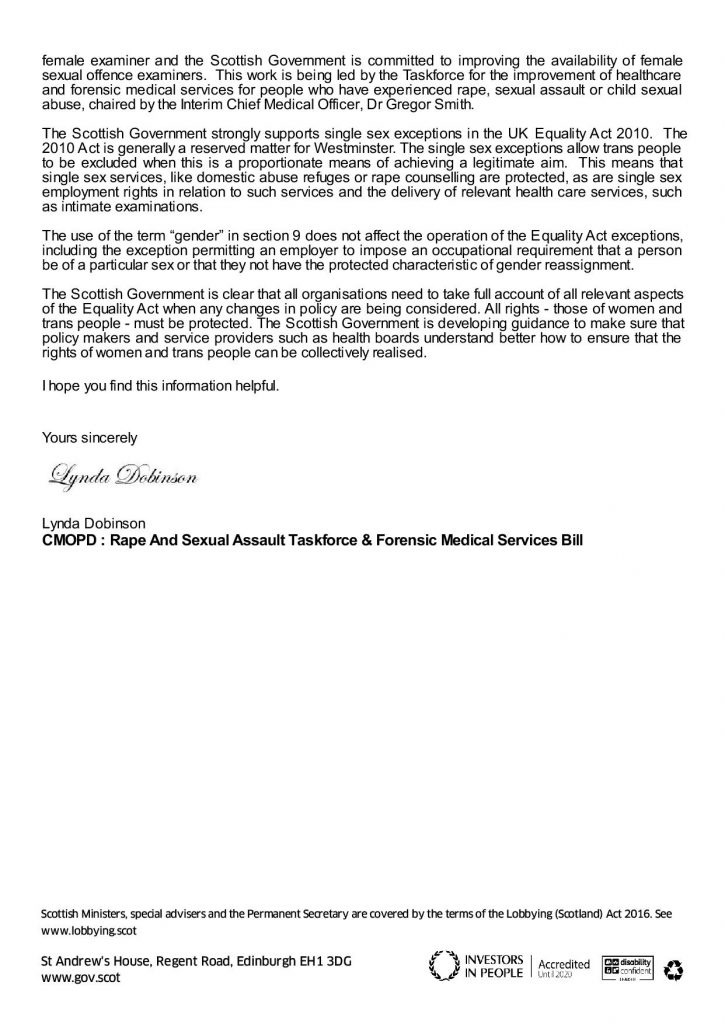Letter to Health and Sport Committee
Following the confusion about sex and gender after media reports on the Committee’s meeting to scrutinise the Forensic Medical Services (Victims of Sexual Offences) (Scotland) Bill, we wrote the following letter to the Committee on 26th June. It has now been published on the Committee’s page. A copy has also been sent to the Sex and Gender in Data Working Group.
Dear Mr Macdonald,
Forensic Medical Services (Victims of Sexual Offences) (Scotland) Bill
Further to media reports on the Committee meeting of 23rd June, we wish to draw your attention to an important point of the Bill which has caused widespread confusion and distress.
The header of an article in The National read “Jeane Freeman has said she is confident rape and sexual assault victims will be able to choose the gender of their forensic medical examiner under new legislation”. [1]
Responding to a poster on Twitter who said their membership of the SNP depended on the answer to the question “Do you mean biological sex?” and not “gender”, Ms Freeman responded with “Actually what I said was ‘choose the sex…” I’m not responsible for how a journalist reports”. [2]
However, from the Official Report, the question asked of Ms Freeman was: “How confident is the Scottish Government that, through the bill and the other changes that you have described, victims of rape and sexual assault will have a real choice about the gender of the examiner?”, to which she replied with “I agree completely that people should have that choice” before going on to talk about the percentage of forensic examiners who are women.
Whilst Ms Freeman may have been clear in her own mind that she was referring to the sex of the doctors conducting examinations, it was not the question asked. Indeed, it is not the term used in the Victims and Witnesses (Scotland) Act 2014, which states that a person may request that the “medical examination be carried out by a registered medical practitioner of a gender specified by the person”. However, what is meant by “gender” is not defined, and it is this ambiguity that has led to many such instances of talking at cross purposes and the unacceptable situation of victims not knowing exactly what they are entitled to ask for.
We note that both the SPICe briefing of the Bill and the Policy Memorandum refer to the sex of the examiner, and the importance of this is stressed by the evidence given by Rape Crisis Scotland who said “The single most common complaint we hear from survivors of sexual crime about their experience of the forensic examination is lack of access to female doctors.” NHS Lanarkshire also commented that the “patient’s choice of sex of forensic examiner must be guaranteed by this legislation”.
The importance of this for women cannot be underestimated. Traumatised women should not be re-traumatised by unexpectedly encountering a male doctor (regardless of his gender, or gender identity) after requesting treatment from a female doctor. Nor should victims feel they must self-exclude from medical services due to uncertainty over being guaranteed a female medical practitioner, or fear of accusations of bigotry for making such a request. Unfortunately, this is not unprecedented, and several cases have been reported. [3] [4]
The Equality and Human Rights Commission has stated that sex and gender are not synonymous [5] and after scrutinising the Census Bill the CTEEA Committee recommended amendments to avoid conflation. [6] Subsequently, the Sex and Gender in Data Working Group has been established to ensure that the two categories remain distinct from each other. [7]
We urge the Committee to take this opportunity to amend the language of the Bill and the 2014 Act to avoid any ambiguity over interpretation, provide clarity in law, and to reassure victims that the steps taken by the Scottish Government meet their need to choose the sex of the medical examiner.
Yours sincerely,
Trina Budge
For Women Scotland
Update 25 September 2020:
The Committee’s Stage 1 report was published earlier this month and we are especially pleased to see the recommendation that the Bill is amended to say ‘sex’ instead of ‘gender’.

In the subsequent response from the Scottish Government, however, they remain unconvinced of the need to make this change to the Bill.

Update 01 October 2020:
The Stage 1 debate in Parliament was held today. (Official report)
Clip of Annabelle Ewing:
We sent the following letter to Cabinet Secretary Jeane Freeman and the Members of the Health and Sport Committee:
We were disappointed that the Government’s response to the Committee’s recommendation that the use of ‘gender’ in the Bill could be ambiguous and should be amended to guarantee the right to choose the sex of the examiner, was not to take it forward, stating “the Government is not immediately convinced there is legislative ambiguity”.
Given the misunderstanding that the Cabinet Secretary recently experienced over this matter, as detailed in our previous letter to the Committee, this is difficult to understand. Indeed, the Stage 1 Parliamentary debate further demonstrated the ambiguity. Some MSPs used sex, some used gender, and others used both terms interchangeably in the space of their short speeches. Some speakers very carefully avoided saying either, and overwhelmingly the phrase “female doctor” was preferred.
One of the priorities of this Bill is the wellbeing and recovery of victims and, as Rape Crisis Scotland has explained, greater access to female doctors as a means to reduce trauma is the single most pressing issue. This can only be achieved by using the term ‘sex’ when referring to the examiner of choice.
Gender is not defined in law. Both the UK and Scottish Governments, as well as the EHRC, are clear that the terms sex and gender are not synonymous. Sex is defined in the Equality Act 2010 as a “reference to a man or a woman”, and a woman as a “female of any age”. In order to meet its objective it is essential that the Bill is clarified and refers to the terminology in law that guarantees access to female doctors.
In order to train and recruit female doctors it is necessary for health boards to use the Genuine Occupational Requirements in Schedule 9 of the Equality Act which allows for recruitment on the basis of sex, where it is justified. There is no legal provision for recruiting on the basis of gender; it is not a protected characteristic and will not ensure female doctors if this is the basis of selection. Ambiguity and conflation of sex and gender has previously led to women being re-traumatised by unexpectedly encountering a male doctor, regardless of his personal gender, despite requesting a female doctor.
We are supportive of this Bill in principle but are concerned that the Scottish Government could inadvertently frame legislation which is not fully effective in achieving its intended effect, and may not be fully compliant with existing law and thus open to legal challenge.
As stated in the Parliamentary debate “I am not interested in legislation unless I can be sure that we can implement it – I see no point otherwise.” With this quote in mind, we request that the Scottish Government re-consider amending the Bill to the sex of an examiner in order that victims receive the services they need.
Yours sincerely,
Trina Budge
For Women Scotland
Update 20 November 2020:
The above letter was not published on the Committee website and we are unsure if it reached the Committee members. We did receive the following response from Jeane Freeman’s office:
(as a pdf)
Update 07 December 2020:
See our new blog post: Six Words
Update 09 December 2020:
See our new blog post: Reaction to Lamont Amendment
Update 10 December 2020:
See our new blog post: Dear MSPs…from survivors
Stage 3 debate on the Bill in Parliament: Video and Official Report
The Lamont amendment was passed 113 votes to 9.
See our new blog post: FWS Statement on the vote for Lamont Amendment


